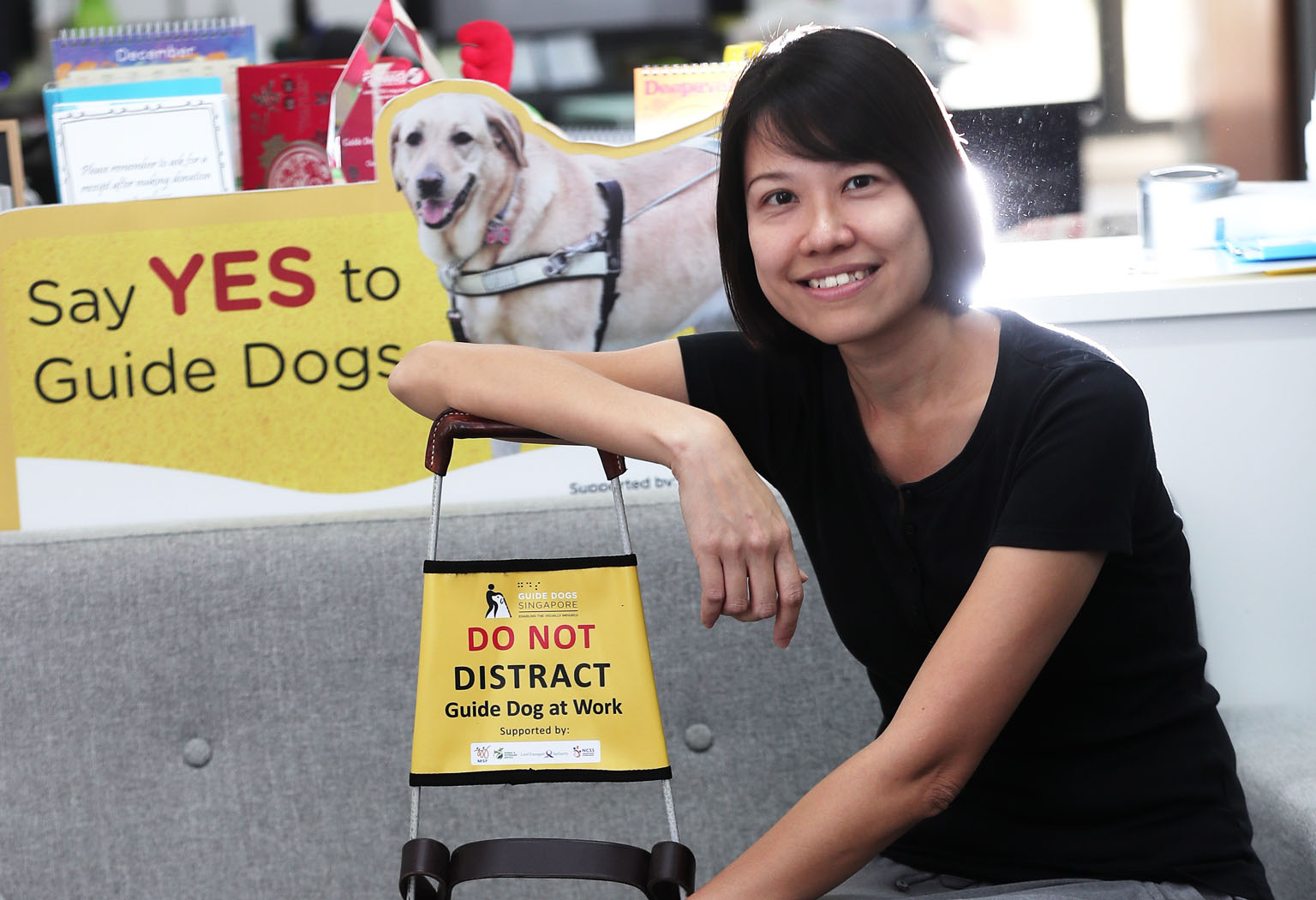Dogged determination helped her become Singapore's first guide dog mobility instructor
Sign up now: Get ST's newsletters delivered to your inbox

Ms Christina Teng relocated her family to Melbourne, Australia, to undergo training for two years to be a Guide Dog Mobility Instructor. During training, she learnt how to use a white cane, among other skills.
ST PHOTO: KELVIN CHNG
A book about working dogs, borrowed from her primary school library, ignited a passion in Ms Christina Teng to become a dog trainer. But that was in the late 1980s when such a job was practically unheard of in Singapore.
Still, Ms Teng, who does not own a dog, never forgot about her childhood dream, even as she went on to become a youth worker and later, a full-time housewife.
And it was no childish fantasy. Last year, she became not only a dog trainer, but also the first Singaporean certified to be a Guide Dog Mobility Instructor (GDMI) - someone who trains guide dogs as well as visually impaired handlers to work with and care for the animal.
"It was a journey that I never thought would happen," Ms Teng, 40, told The Straits Times.
Her certification is warmly welcomed by the guide dog community here as the world celebrates International Guide Dog Day (IGDD) tomorrow.
Said Guide Dogs Singapore: "This year's IGDD in Singapore is special because of the graduation of Singapore's first and only GDMI."
Four years ago, the charity was looking for a Singaporean to fill the position of a GDMI. Ms Teng went through a selection process to attend training in Melbourne, Australia.
Said Guide Dogs Singapore's general manager Vanessa Loh, 44: "That person must really want to do this, to the point of dedicating (his or her) life to being a GDMI."
And Ms Teng fit the bill. In fact, she was so passionate about her work that she relocated her family to Australia during the two years of training. Her two children were then seven and nine years old.
The biggest support came from her husband, Mr Leonard Chin, 40, who not only encouraged Ms Teng to apply for the training, but also took unpaid leave from his IT consultant job during those two years to be with her and the children.
"The family is really happy that Christina managed to pursue her dream," said Mr Chin.
While Guide Dogs Singapore took care of the training cost, which was slightly more than $100,000, and provided a monthly allowance to cover housing and basic living expenses during Ms Teng's time in Melbourne, she and her husband paid for everything else, including schooling for their children.
During training, Ms Teng learnt how to use a white cane, among other skills, for a better understanding of how visually impaired people navigate their surroundings.
Guide dogs are permitted on public transport and at eateries here.
Ms Teng also trained under a senior guide dog instructor.
A guide dog goes through health checks and a week of assessments before training starts, usually when it is between 12 and 14 months old.
Guide dog puppies are socialised with human touch and enrichment toys at five to seven weeks old to get them used to sounds and objects, as well as being handled by people.
This is then followed by a year of socialising them in the general environment by puppy raisers who take them to public places such as supermarkets, shopping centres, cafes and on public transport.
The dogs also have to meet milestone checks during the five-month training period. With such stringent requirements, only 40 per cent of dogs under training eventually graduate as guide dogs. The rest are placed in other "career roles" such as being companion dogs.
While the labrador retriever and golden retriever are the two most popular breeds for guide dogs because of their hardworking and gentle temperaments, not every dog has the same personality.
Ms Teng recalled having a dog under training that was more introverted and sensitive, slower in pace and less confident in making guiding decisions. To encourage it, she broke down the training into manageable portions and practised positive reinforcement. That dog is now part of an established guide dog team in Melbourne.
Back in Singapore, Ms Teng has successfully trained and paired Orinda, a two-year-old guide dog from Australia, with marketing specialist Sophie Soon, 23.
There are currently four people in Singapore on the waiting list for a guide dog, said Guide Dogs Singapore. While the charity pays for the dog's training expenses, the client is fully responsible for its upkeep, which may amount to $1,200 a year.
Currently, the charity gets its dogs from Guide Dogs Victoria in Melbourne.
The charity here has six guide dog teams. Before Ms Teng, it would tap the expertise of overseas instructors. Now that Singapore has its own GDMI, problems that clients have with their guide dogs can be resolved more readily.
Said Ms Teng: "I wish to be able to support guide dog users here so that they can be empowered to step out and live their life to the fullest.
"I hope that through them, society will be able to recognise the work that guide dogs are able to do for the visually impaired."
• To find out more about International Guide Dog Day, visit www.guidedogs.org.sg


